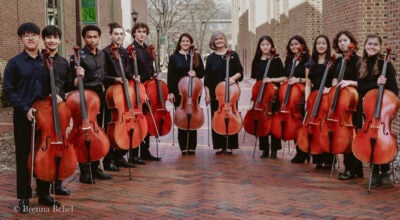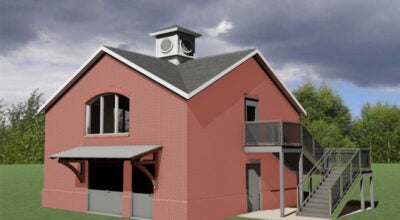Steel prices drive Hardy cost to $36M
Published 6:06 pm Tuesday, September 21, 2021
Equity opponents call for project’s defunding
Hardy Elementary’s design team may have spoken too soon when quoting Isle of Wight County’s School Board a guaranteed maximum price of $33.7 million Sept. 9 for the new school.
According to Bill Cram, executive vice president of the project’s general contractor, M.B. Kahn Construction, the currently inflated cost of steel will add another $2.7 million to the overall price.
The $33.7 million price the School Board voted unanimously to accept didn’t include a firm quote for steel, Cram told Isle of Wight’s Board of Supervisors on Sept. 16. Last year, during the early days of the coronavirus pandemic, the construction industry continued to operate as a designated essential service, but a number of the industry’s suppliers were forced to shut down, resulting in skyrocketing demand for building materials that’s caused prices to soar and months-long delivery delays, he explained.
The market was so unstable, he said, that Kahn’s steel suppliers refused to even provide a price quote until Kahn could guarantee the Hardy project would be moving forward. After the Sept. 9 School Board vote, “we felt we had the ability to go to the steel suppliers,” Cram said.
Rising costs aren’t the only factor that may stall the new school’s completion.
Public opposition at recent School Board meetings to Isle of Wight County Schools’ equity and inclusion initiatives and other “actions by our school system” have “caused citizens to ask me to look at not funding operations, or even this very school,” Windsor District Supervisor Joel Acree said.
When Kiyaana Cox-Jones, the school system’s coordinator of equity and inclusion, briefed the Board of Supervisors on her work in June, “I was excited,” Acree said. “But I think a lot of things have changed in a short amount of time in our community.”
Since then, a number of speakers have accused Jones and other members of Isle of Wight County Schools’ leadership of bringing Critical Race Theory into the school system through the equity program.
Critical Race Theory argues American law and institutions have perpetuated social, economic and political inequalities among minority groups. Critics say the concept is divisive and has the potential to set Blacks and whites against each other.
School officials have repeatedly stated Isle of Wight isn’t teaching Critical Race Theory but critics argue Jones’ teacher training and Smithfield High School’s “Read Woke” library challenge could have a trickle-down effect and indoctrinate students. The “Woke” challenge — named for the slang reference to an awareness of injustice, particularly racism, in society — is voluntary and involves encouraging students to read social justice-themed books.
“We’re not paying for [Hardy]; the citizens that we represent are paying for it,” Acree said. “A citizen, or a group of citizens or the entire county is a whole lot more willing to step up and pay … when they really buy into the entire system. You can’t separate the two, because these are the people that are paying the taxes.”
The $2.7 million figure is based on one quote. Kahn plans to obtain two or three more quotes. The Board of Supervisors called a special meeting to discuss a new guaranteed maximum price for Sept. 21 at 7 p.m. in the boardroom of the Isle of Wight County government complex. By press time on Tuesday, the meeting had yet to begin.
Cram had told the School Board Sept. 9 that should construction end up costing more than the guaranteed maximum, Kahn would assume responsibility for any overage. But according to Assistant County Administrator Don Robertson, the contract isn’t final until voted on and signed by both the School Board and the Board of Supervisors, since the supervisors are funding the project.
Last year, the county borrowed $34 million to fund the replacement school’s construction, working off the assumption that a new Hardy could be built for around $27 million. The county had planned to use the rest for other capital needs, such as replacing emergency vehicles, and in April, signed a contract pledging $1.8 million toward purchasing two new fire trucks for the Smithfield Volunteer Fire Department.
If Kahn can’t find a lower price for steel, the additional $2.7 million could bring the project’s overall price to over $36 million.
“At the time, and I’ll take the blame, I thought we could build this school for $27 million. … I was wrong,” said Board of Supervisors Chairman Dick Grice. “I didn’t see the future.”
That said, during the public hearing the county held Sept. 10, 2020, on the then-proposed loan, “There wasn’t one person that night that said they didn’t want to go forward,” Grice said.
Carrsville District Supervisor Don Rosie called the need for a new Hardy “very evident” and acknowledged the “overwhelming push” last year was to move forward with the project, but, like Acree, suggested the county’s schools were changing their focus “away from, perhaps, academic studies” and “increasing our focus on social engineering.”
“I can’t say I’m really on board with that,” Rosie said.
He also took issue with a 30-minute cap on public comments specified in School Board Policy BDDH-E.
“The citizens are upset, and it’s not just from the southern district,” Rosie said. If “we need to reconsider some of our financial decisions and all because of what’s going on then so be it.”
Hardy District Supervisor Rudolph Jefferson, however, called on his fellow board members to “listen to the citizens from all over the county, not just one segment.”
“We made an honest decision based on what was said and what was done at the public hearing,” Jefferson said, adding that the county “cannot control the prices” of building materials.
“We said we care about the kids; this is one way we can show we care about the kids,” he said. “We can give them what they need, give the teachers what they need.”
He then called on critics of the school system’s equity initiatives to “be transparent” and “be able to listen” when evaluating the need for equity and inclusion.
“Just because I don’t believe in something, that doesn’t mean it’s not necessarily needed in the public setting,” Jefferson said.
Newport District Supervisor William McCarty said he too had received correspondence arguing to stop the Hardy project, but “would you say the costs are only going to get worse?” he asked Cram.
“This market is not going to moderate any time soon,” Cram replied. “My crystal ball says at least a year, probably longer.”





